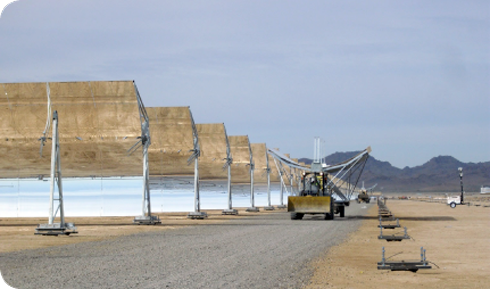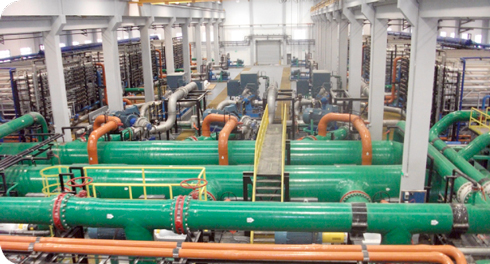 Abengoa
Abengoa
Annual Report 2012
- Activities
- Activities
- Engineering and construction
Abengoa, with seventy-plus years of experience in the energy and water engineering and construction market, boasts a lengthy track record in performing complex turnkey projects: solar thermal plants, hybrid solar-gas turbine plants, conventional power plants and biofuel facilities, together with hydro infrastructures, including large-scale desalination plants and power transmission lines, among others.

The prevailing uncertainty and instability plaguing the markets is testing the mettle of companies, which are now having to demonstrate, more than ever before, their management capacity and ability to adapt to change. We are proud to announce therefore that Abengoa’s Engineering and Construction division has once again responded well to the crisis while remaining loyal to the company’s strategy: it closed out the year with a total of €4,512 M under construction, €3,738 M in procurement and €6,679 M on the order book, the back of the company’s drive to diversify business activities and regions.
The division not only continues to offer promising growth potential, but year after year continues to better itself in terms of profit reported and projected future earnings. It is continuing with its recent drive towards international expansion and growth, while cementing its leadership in those markets where it operates.
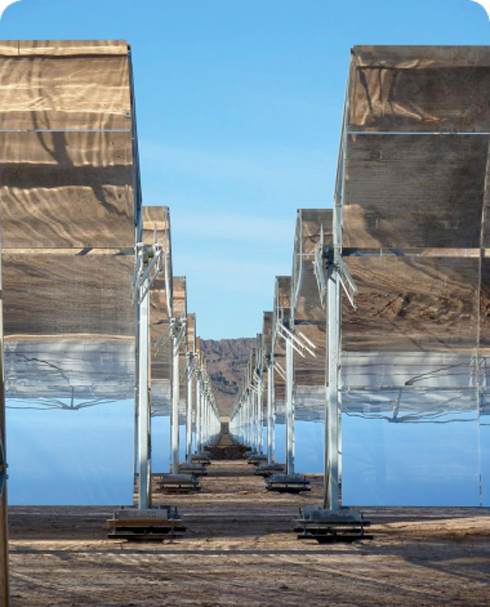
With engineering and construction being the cornerstone of Abengoa business, the company’s mission in this field could essentially be defined as the design, engineering and construction of:
- Transmission systems and power generation plants.
- Water treatment and desalination plants, hydro facilities and waste treatment.
- Industrial infrastructures and installations associated with conventional and high-speed rail travel.
- Telecommunication systems.
- Civil engineering.
The overarching aim of the division is to become an international market leader in the engineering and construction of energy and environmental infrastructures and industrial installations on the path towards sustainable development.
The Engineering and Construction division has established a stable footing now in over 40 different countries across five different continents, thus requiring it to adjust to the different social, cultural and economic environments in which it works, focusing its business at all times on local corporate responsibility. It is therefore able to understand and adapt to the different needs of each community in which it operates its different lines of business.
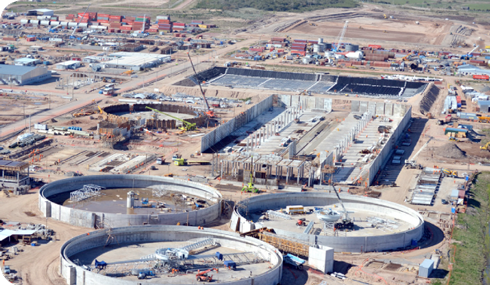
Human capital is a key factor in accomplishing its objectives. Employees contribute knowledge and are the force driving the company forward. Relying on teamwork and drawing on their professionalism and excellence, our employees are without doubt what marks the Engineering and Construction division apart from the competition.
Three key ideas underpin the strategy of this division: technology, discipline and diversification. This has provided the platform for sustained growth, which has catapulted the company forward and positioned it among the world’s leading construction firms in the field of power infrastructure. According to the ENR (Engineering News Record) table for 2012, Abengoa ranked as the largest international construction firm in power transmission and distribution, the second largest international constructor of electrical infrastructure and the fourth largest contractor in Latin America. As a first this year, Abengoa has been ranked among the largest contractors operating in the United States, coming in eighth. It also ranks leader in the cogeneration and solar power sectors.
Detailed below are the main projects that Abengoa’s Engineering and Construction division is currently engaged in by region:
America
- Work is continuing on the one-stop turnkey engineering and construction project to construct a 640 MW combined cycle plant in Centro Morelos, Mexico. This electrical power plant of the Mexican Federal Electricity Board (“Comisión Federal de Electricidad”, or CFE) will form part of the “Proyecto Integral Morelos” project, a key initiative in developing central Mexico.
- Work is also continuing for the CFE on an EPC contract to construct the 42.3 MW Baja California Sur IV internal combustion plant in the state of Baja California Sur.
- Commencement of the Agua Prieta Fase III EPC contract to construct a 12 MW solar field in the state of Sonora (Mexico), which will be integrated with a combined cycle gas turbine (CCGT) to become Mexico’s first hybrid solar-gas turbine plant.
- Completion of work on the 300 MW cogeneration plant in Tabasco (Mexico), which is located at the facilities of the state-owned company Petróleos Mexicanos (Pemex). The power plant is capable of generating electricity and thermal energy through two gas turbine generators with their respective electric generators, and two heat recovery steam generators. The new plant, which Abengoa will also operate and maintain for 20 years, will be able to generate up to 800 t/h of steam to supply electricity to the Nuevo Pemex Gas Processing Complex in Tabasco, while feeding surplus power to the Mexican power grid.
- Abengoa is pressing on with the engineering project for the El Zapotillo Aqueduct, which includes the construction of 139 km of large diameter piping; pumping stations with a total installed capacity of 24,000 kW; a water treatment plant of 3,800 L/s; a 100,000 m³ storage tank and a 40 km distribution circuit within the municipality of León (Mexico). The contract also envisages a 25-year concession to operate the aqueduct.
- Work is continuing on the 500 kV power stations for UTE in Uruguay. The project involves the supply and turnkey installation of two 500 kV stations, effectively connecting the Punta del Tigre power line with the existing 500 kV Uruguayan power transmission grid.
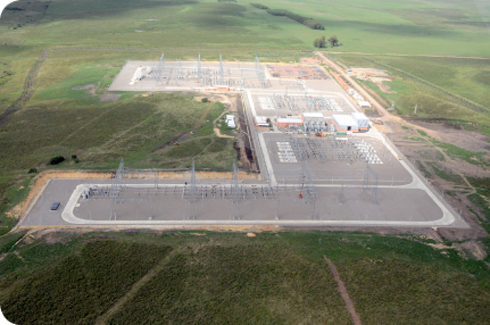
- The project embraces the design, construction, operation and maintenance of the wind farm, which contains 25 wind turbines. The farm will be operated for a 20-year term running from final delivery and start-up. In the final quarter of the year Abengoa was awarded a contract for a new 50 MW wind farm in Uruguay, including operation for a 20-year term. Aneel (the Brazilian National Electrical Power Agency) also awarded Abengoa three other wind farms in Trairí, with a combined installed capacity of 64 MW.
- In Uruguay, Abengoa has secured the new 50 MW Cadonal wind farm for the state-owned utility (UTE) “Administración Nacional de Usinas y Transmisiones Eléctricas”. The company has also been awarded a 70 ML bioethanol plant for the state-owned company Alcoholes de Uruguay (ALUR). The facility will process sorghum, corn, barley and wheat and will be located in Paysandú (Uruguay). The project also envisages the construction of an 8 MW cogeneration facility annexed to the parent plant, which will supply the latter with electricity and steam using biomass as feedstock.
- In Arizona, the Solana solar power plant is nearing completion, with the start-up phase already under way. The 280 MW facility features parabolic trough technology and boasts six hours of heat storage. More specifically, the facility already has all its main equipment installed, along with the transmission line and electric substation to evacuate power, both of which are now live. In addition, the salt melting process has already started for the thermal storage system. The plant is expected to enter operation at some point in 2013, whereupon it will become the world’s largest solar power plant of its kind.
- In California, construction of the 280 MW Mojave Solar parabolic trough plant is progressing rapidly and well on schedule. Assembly of the troughs for the solar field is already under way and most of the work is currently focusing on civil engineering, completing foundations for the main items of equipment and lifting various tanks for water and thermal oil.
- In the United States, Abengoa has been awarded the engineering, construction and start-up of what is to be one of the world’s largest photovoltaic plants, with an installed capacity of 200 MW and with the project worth $360 M. The facility is to be constructed in 18 months and is expected to be brought online gradually over the latter half of 2014.
- The company is currently building the first second-generation bioethanol plant planned for commercial operation, located at Hugoton, Kansas. The facility will run on cereal straw instead of grain, producing 95 ML of bioethanol a year and 20 MW of electricity.
- In Peru, the company Minera Cerro Verde has chosen Abengoa for the engineering, construction and start-up of the 500/220 kV La Joya transformer substation and the 220 kV San Camilo transmission line (TL), with the value of the contract exceeding $160 M.
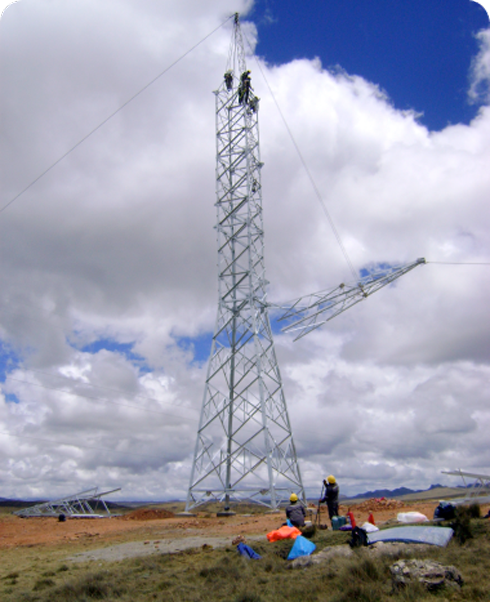
- Construction is continuing on the 500 kV Chilca-Marcona-Ocoña-Montalvo transmission line and three new substations in Peru, along with upgrade work on a further three, including the installation of two series compensation capacitors at the Ocoña substation. The 872 km project encompasses the design, supply, construction and financing of the entire electricity system, and operation and maintenance for a 30-year term.
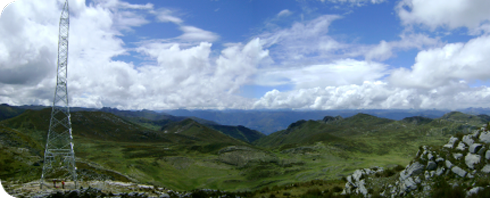
- Work is also continuing in Peru on the 220 kV ATN2 Las Bambas-Cotaruse TL. This project includes engineering work, procurement of equipment and construction of the line, which will span roughly 132 km. The contract also envisages line operation and maintenance for 18 years.
- Work on a further three lines is also progressing in Brazil: the 230 kV Jauru-Porto Velho alternating current line, as part of the Pre-Madeira project, with a total length of 987 km; the 586 km and 500 kV Oriximiná-Silves-Lechuga line; and, last but not least, the 108 km and 230 kV ATE VIII Itacíunas-Carajás power line, with the contract encompassing not only line construction but also operation and maintenance for 30 years.
- Abengoa has started construction of the 600 kV Coletora Porto Velho-Araraquara 2 Bipolo2 DC (direct current) line in Brazil, which will measure approximately 2,412 km, one of the largest in the world, and is designed to transmit a maximum of 3,150 MW.
- In the last quarter of 2012, Abengoa walked away with a concession agreement for three new power transmission lines in Brazil. The new efficient and sustainable infrastructure will help meet part of the country’s energy demand once operational, which is scheduled for March 2016. The first concession involves four transmission lines spanning 1,816 km and two electrical substations in the states of Tocantins, Piauí, Bahía and Maranhao, while the second of the contracts will require the company to construct a 286 km transmission line and two substations in the states of Ceará, Paraíba and Río Grande do Norte. The third and final contract awarded to Abengoa consists of a 370 km transmission line located between the Estreito and Itabirito 2 stations in the state of Minas Gerais.
- Completion of work on the Abengoa Brasil building in Rio de Janeiro. The project involved the turnkey construction of an office building located in Barra de Tijuca, with a floor area of 8,070 m² on four levels. All phases of the building (design, construction, operation and maintenance) were originally conceived with sustainability firmly in mind with the aim of securing the LEED (Leadership in Energy and Environmental Design) “Green Building” certificate.
- Abengoa has also signed three further EPC contracts in Chile: two to upgrade line capacity for E-CL and Transelec Norte customers through live line installation work along sections of 244 and 174 km, respectively; and the third to construct a 15 km power transmission line at 110 kV.
- In Chile, the Sierra Gorda mining company has awarded Abengoa three new contracts: the construction and operation and maintenance of two TLs, measuring 50 and 79 km, and an EPC agreement embracing the design, construction and start-up of all the transmission lines at 33 kV.
- Also in Chile, Cleanairtech Sudamérica S. A., a company belonging to the Compañía Minera del Pacífico (CAP) group, awarded Abengoa a contract worth $65 M to develop a desalinated water piping system.
- Abengoa has been selected by Canadian mining company Goldcorp to carry out the engineering, design, construction and commissioning of the entire 132 kV electric power transmission project, which will span a total of 55 km in the province of Santa Cruz, in southern Argentina.
- Also in Argentina, the company was chosen by Fondo Fiduciario para el Transporte Eléctrico Federal (CAF) to interconnect the Río Coronda and Rosario Oeste transformer stations (Argentina). The contract, worth $70 M, involves the turnkey construction of a extra-high voltage 500 kV line spanning 65 km in the province of Santa Fe, lying between the Río Coronda and Rosario Oeste transformer stations, and also requires Abengoa to upgrade both transformer stations.
Africa
- Financing was secured in 2012 and construction started on the Khi Solar One (50 MW) plant, employing superheated steam tower technology and two hours of heat storage, one of the largest in the world to utilize this technology. The facility is located close to Upington, in the Northern Cape province of South Africa.
- Work has also got under way on the KaXu Solar One plant, a 100 MW parabolic-trough solar power facility with a heat storage capacity of three hours. The plant will be sited outside the city of Pofadder, also in the north of the Northern Cape province of South Africa. To construct and develop both plants, Abengoa has joined forced with IDC (Industrial Development Corporation), South Africa’s largest development finance institution. This partnership has been made possible thanks to Abengoa’s ongoing drive towards sustainable development, particularly its contribution towards the progress of the communities in which it operates.
- Abengoa has secured a $231 M contract for a new desalination plant in Tenes (Algeria), which will have a capacity of 200,000 m³ of water per day.
Asia and Middle East
- Construction work is now in progress on the high-speed rail line to link up the cities of Medina, Jeddah and Mecca in Saudi Arabia, a contract awarded to the Spanish-Saudi Arabian consortium Al Shoula Group (with Abengoa being one of the members). The contract includes the construction and assembly of the railroad line, spanning roughly 450 km of electrified double track designed for trains to travel at speeds of up to 350 km/h, along with installation of the signaling and telecommunications systems, rail electrification, the operations and control center, and full maintenance for 12 years.
- Construction is also continuing on the 100 MW Shams-1 parabolic trough solar plant, the largest concentrating solar thermal facility in the Middle East, located in the desert surrounding Abu Dhabi. The plant will be the first site to operate in the desert and has been specifically designed for this environment. The project is currently at an advanced stage of the start-up phase, meaning the solar field is already operational and it is expected to enter into operation in 2013. The plant will help curb annual CO2 emissions by 175,000 t thanks to nearly 600,000 m² of parabolic troughs.
- Completion of the seawater desalination plant at Qingdao. The facility will be able to desalinate 100,000 m³ of water per day and will supply drinking water to 500,000 people.
- The company ACWA Power International has tasked Abengoa with the design, engineering, construction and subsequent operation and maintenance support for a desalination plant employing reverse osmosis technology in Barka, Oman. The plant will cost $55 M and will eventually supply drinking water to more than 225,000 inhabitants.
- In Gujarat, India, Abengoa is constructing a new factory to manufacture metal structures, which will have an annual production capacity of 30,000 t to meet company needs in neighboring regions.
Europe
- Abengoa has been entrusted with the engineering and construction of Poland’s largest combined cycle plant, boasting an installed capacity of 450 MW. The contract signed with the government-sponsored electric utility and gas distribution company is worth €380 M.
Oceania
- Lastly, we would highlight the company’s entry into the strategically important Australian market with a 132 kV line, which is expected to open up the doors to more opportunities within the region.
Mirrors at a solar power plant
Aerial view of Montes del Plata (Uruguay)
Aerial view of the Melo frequency converter station (Uruguay)
Construction of a transmission line in Peru
T93 Chaquicocha - Andahuaylas, 4,450 mamsl (Peru)
Moving mirrors at a solar power plant
Desalination plant, Quindao, China
© 2012 Abengoa. All rights reserved
